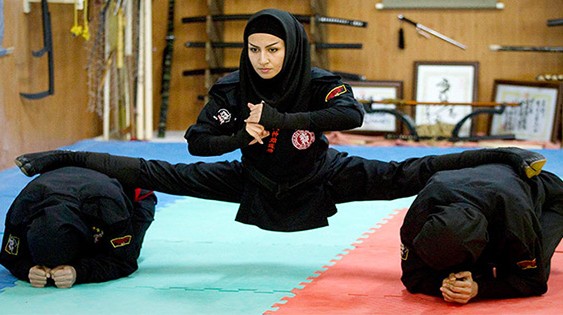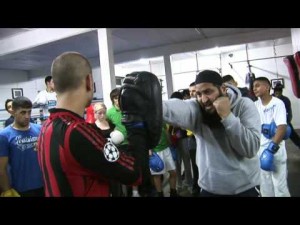Ramadan Training Guide

This is not going to be your usual guide to training. It’s not only about training during the month of Ramadan, but also about the integration of martial arts principles in Ramadan.
Every year when Ramadan comes around, people who workout become confused as to what to do about their training, while others view it as as an opportunity for weight loss. Some worry about getting weaker and taking a break from exercise, some are concerned about losing mass, some are even concerned about gaining weight! If that is your concern this month, then you are not ready for the guidelines in this article. However, there are other sources that you can research for help.
I too readily admit that there have been years where I have let the desire to always get better as an athlete get ahead of the priorities that sometimes need to take precedence. Ramadan is a month where we are blessed to be able to let go of the pressures of the material world and focus inward. So this training guide is not going to be how to train in spite of it being Ramadan, rather it will guide you to use your training to maximize the benefits of this month and hopefully ingrain lifelong habits.
The way I see it, there are three main material concerns that one has to try and balance in order to stay healthy and strong in Ramadan, and to help with the internal focus. These are:
- Nutrition and Hydration
- Physical Conditioning
- Mental Conditioning
Nutrition and Hydration

The key when it comes to having a successful and healthy eating plan, is planning. Failing to plan is planning to fail. At Iftaar time you will you be offered many, many options of unhealthy eating. You must have food prepared. I would suggest that you prepare your sehri and iftaar meal at the same time. You should also have a number of meals that you will be eating after Iftar.
I would venture to say that the most important thing that one needs to do for one’s physical training during Ramadan is preparation. Failing to plan is planning to fail and it is very true in this instance. There will ironically be many temptations during Ramadan. In fact, I am quite sure people eat WORSE during Ramadan. After spending all day with nothing in your stomach, people seem to think that it is okay to gorge on buffets of fast food or heavily fried food. Not only is this very unhealthy, but I also think it goes against the spirit of the month. Staying disciplined all day just so you can later eat in excess of what you would normally consume seems somewhat foolish and counterproductive.
What I would recommend regarding diet is to eat in as balanced a manner as possible. The main focus is to get enough of the proper breakdown of calorie sources (protein, carbs and fats) with as many high quality nutrients as possible. Eat plenty of raw vegetables and fruits and high quality fats. We’ll have more information about nutrition details in the next series. If any of you have confusion as to what general healthy eating is, do some research and use common sense. There is plenty of information online, but here are the most fundamental guidelines:
Breakdown of daily carbs, protien and fat should be between
- 45% to 65% of calories eaten should come from carbohydrates.
- 20% to 35% of calories eaten should come from fat.
- 10% to 35% of calories eaten should come from protein*.
The majority of your food should be fresh vegetables and fruit. It should be raw when possible but there is nothing wrong with eating cooked vegetables as certain nutrients are released only after cooking. Having a mixture of raw and cooked is ideal.
Try to get most of your fat from good sources like olive oil, fresh butter and nuts. Try not to overheat oil or reuse, such as in deep frying.
Not all of your protein needs to be meat. Yogurt, cheese, nuts and milk are all protein sources and there are many others.
Avoid junk food and sugary drinks. However, it’s okay to limit yourself to one serving per day. PER DAY. Not per meal. That means one glass of coke, one piece of mathai or cake. Would having one serving of junk and/or dessert per week be better? Probably. But it’s not realistic for most people and one serving per day is probably a drastic cut down from what people normally eat.
Dehydration is one of the main health issues that people must take care of during Ramadan. It is vital to properly rehydrated after Iftaar. Water is far more important than food in feeling your best for this spiritual month. It is so hot in Pakistan right now that you will lose a lot of water during the day. You must do your best to replenish whatever was lost during the day. Your body can process one liter of water per hour. Ideally, between sehri and iftaar you should have consumed 8 liters of water. I know that’s a lot of water, but it’s to be on the safe side and will help with detoxifying and cleansing your body over the month.
Physical Conditioning
- Keep training short
- Quality over quantity
- Work on a weakness
- Technical Training
You will not be able to train with the same intensity or volume as you are used to! But that doesn’t mean you have to completely abandon everything. It simply means that you need to train with this rule in mind “QUALITY OVER QUANTITY.” Make your workouts shorter than normal but make sure that you are 100% focused on doing quality work with each rep or movement drill. Get to the gym and be in and out; you should complete your work within 45 minutes. Don’t socialize, don’t waste time. You have other priorities and your body is going through a specific regimen and routine that is not made to conduct a fight camp for a 3 round war.
Another thing that you can do, and which I will try during this Ramadan, is to focus on a weakness. For me that is flexibility and I am guessing that is also the case for many of you. Flexibility training, namely yoga, requires a strong mind body connection, which is a very good thing to work on during a month like Ramadan. That being said, you do not have to limit yourself to flexibility training.
Make Ramadan a period where you focus on perfecting your technique. This definitely doesn’t mean you focus on technique only one month out of a year (only Ramadan). But it does mean that you put a particular focus on training technically, more than you might otherwise. This would ideally result in a more disciplined ability in the future to focus on the perfection of technique.
Mental Conditioning
One aspect of the martial arts that is often neglected by people, but which is an all important part of training, is the mental part of combat sports (and most all endeavors in life). The “mental game,” as it is often called, is something that can be trained despite what some people believe. Positive self-affirmations, visualizations and just being in touch with the deep internal reasons for why you fight, all serve to make you a better athlete and a much more powerful fighter; it IS a part of your training regimen especially if you’re a martial artist.
Visualization is a great training tool. Since you’re not going to be training as you normally would, this is a great time to do some visualization training. There are many forms and methods that you can use for a variety of skills and attributes. Do some research, and if requested, maybe we can further explore the topic in a later article.
Conclusion
The martial arts have historically and traditionally had strong links with spirituality, making Ramadan the perfect time to discover and forge the connection between your martial arts training and your spiritual life. The connection between martial arts as an expression of something much deeper is an understood concept amongst many, if not most people. Use the archetype of the honorable martial artist as a way to get the most benefit from the month of Ramadan!
 Bashir Ahmad is one of the most widely recognized figures in the Pakistani MMA scene as well as the broader Asian scene. He is the founder of PAKMMA and a professional MMA fighter signed to ONE Fighting Championship. He holds a Masters Degree in Exercise Science from the University of California in Pennsylvania and currently owns Synergy MMA Academy in Phase 4 DHA Lahore. If you are interested in training at Bashir’s home facility please visit www.club-synergy.com or call 0334 413 7706.
Bashir Ahmad is one of the most widely recognized figures in the Pakistani MMA scene as well as the broader Asian scene. He is the founder of PAKMMA and a professional MMA fighter signed to ONE Fighting Championship. He holds a Masters Degree in Exercise Science from the University of California in Pennsylvania and currently owns Synergy MMA Academy in Phase 4 DHA Lahore. If you are interested in training at Bashir’s home facility please visit www.club-synergy.com or call 0334 413 7706.
